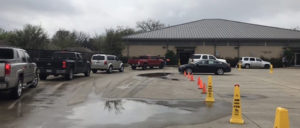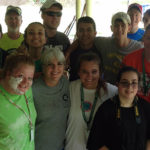DALLAS—New moms in West Dallas know they can depend on Brother Bill’s Helping Hand for solid information about how to care for their babies—and for the one-month supply of disposable diapers they receive when they complete parenting education classes.
Typically, expectant women and mothers of newborns attend three days of classes to learn the basics of baby care before Diaper Day, a celebration when they receive a month’s supply of diapers and other infant-care supplies as a reward for their participation in the nonprofit ministry’s educational program.
When group gatherings had to be cancelled after multiple confirmed cases of COVID-19 throughout the Dallas area, leaders of Brother Bill’s Helping Hand decided the two days of instruction mothers completed before stay-at-home orders went into effect would have to be sufficient. Providing diapers and other essential supplies to families with infants took precedence over the final day of classes.
“That’s when we made the decision to move to a drive-through experience” for Diaper Day, said Wes Keyes, executive director of Brother Bill’s Helping Hand.

Instead of a graduation party, Diaper Day in mid-March was a drive-through event, as gloved volunteers loaded supplies into cars for parents, he explained.
Brother Bill’s Helping Hand focuses on three key components—educational programming, healthcare and the essentials of life, particularly food for families in need, said Keyes, a member of Cliff Temple Baptist Church in Dallas.
The ministry—founded seven and a half decades ago by Bill Harrod, a Baptist preacher who saw needs among his West Dallas neighbors and wanted to meet them—now serves about 300 families a week at its grocery store and about 3,000 patients a year at its community clinic.
Churches around the state help support Brother Bill’s Helping Hand through gifts to the Texas Baptist Hunger Offering.
‘Our time to shine’
COVID-19 and restrictions mandated to control its spread compelled the ministry to adapt quickly to changing circumstances, Keyes noted. Families in need throughout West Dallas, Oak Cliff and the surrounding areas have grown to depend on Brother Bill’s Helping Hand for multiple services.
Sign up for our weekly edition and get all our headlines in your inbox on Thursdays
“This is our time to shine. A lot of ministries have become very narrowly focused and specialized. We’ve been a jack-of-all-trades for a long time,” he said.
In the current COVID-19 crisis, the ministry made changes rapidly to find ways to continue to meet a variety of needs in unconventional ways.
“We’re best known for our grocery store. That’s been our on-ramp to everything else,” Keyes explained.

Brother Bill’s Helping Hand offered its first weekly drive-through grocery distribution on March 14. Qualified families receive a month’s supply of food and other necessities.
“We’re providing about $300 worth of fruit, vegetables, meat, frozen food, eggs, milk and other essentials. We even have toilet paper,” said Keyes, a graduate of Baylor University’s Truett Theological Seminary.
Brother Bill’s Helping Hand put into place strict guidelines to protect volunteers, he noted. Each person who enters the ministry’s building is screened and has his or her temperature checked. No more than 30 masked and gloved volunteers are allowed in the ministry’s building at a time, and they seek to maintain six-feet distance between them as they work.
Grocery recipients are asked to open their car’s trunk or back door for when they arrive at the drive-through. That way, when volunteers deliver the groceries, they don’t have to touch the vehicles.
‘We’re not going away’
Partner congregations in the area, including Park Cities Baptist Church in Dallas and Parkway Hills Baptist Church in Plano, have provided in-kind donations of peanut butter, jelly, sandwich meat and bread to help Brother Bill’s serve families with young children who need quick and easy lunches.
Rather than complete forms in personal interviews to qualify for the groceries, Brother Bill’s implemented online registration for the first time. It proved so successful, the ministry hopes soon to begin offering its English-as-a-Second-Language classes through online platforms.
“In the past, we had said, ‘A lot of the people we serve don’t have computers.’ Then we realized nearly all of them have cell phones. Those are powerful tools we can use,” Keyes said.
Working with its partners at Baylor Scott & White Health and Methodist Health System, Brother Bill’s also is using Telehealth to deliver some services and to pre-screen patients who need in-person medical attention.
“This is a crazy and ridiculous time, but we took action quickly,” Keyes said. “A lot of people have had to shut down services now. But we’re not going away any time soon.”














We seek to connect God’s story and God’s people around the world. To learn more about God’s story, click here.
Send comments and feedback to Eric Black, our editor. For comments to be published, please specify “letter to the editor.” Maximum length for publication is 300 words.